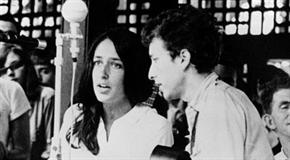Newport Folk Festival Turns 50
She sang in her signature soprano that night, and her career quickly took off; she released an album on a major record label, landed on Time magazine’s cover and made repeat appearances at the festival alongside on-off romantic partner Bob Dylan.
“I didn’t faint; I sang, and that was the beginning of a very long career,” Baez says about her 1959 festival appearance. “It’s all very extraordinary that my career has been going on all that long time and so has Newport.”

Baez returns to Newport this weekend as the heralded festival marks its 50th anniversary. She shares the bill with 90-year-old Pete Seeger, another of the festival’s original performers and a towering folk icon, as well as Arlo Guthrie, Judy Collins and more contemporary acts.
The half-century milestone lends an air of nostalgia to an event that not only helped pioneer the concept of grand-scale outdoor concerts but has also been inexorably linked to fierce social activism – especially in its early years.
“The Newport Folk Festival has always sort of been the standard bearer of early music festivals,” says New York rock radio personality Dennis Elsas. “If you say, ‘and they played the Newport Folk Festival,’ it resonates a certain time. It resonates the time of Pete Seeger, Joan Baez and Bob Dylan.”
The microphone was often a platform for promoting civil rights – and protesting war.
In 1963, Peter, Paul and Mary, Seeger, Baez, the Freedom Singers and other performers clutched hands and belted out the civil rights anthem “We Shall Overcome.” That same year, his first at Newport, Dylan performed “Only a Pawn in Their Game,” which recounts the assassination of civil rights activist Medgar Evers. And Baez joined audience members and representatives of the Student Nonviolent Coordinating Committee on a civil rights march through Newport.
“I think it showed that songs can be an important thing in democracy,” says Seeger, who will close out both nights of this year’s festival with a singalong. “If we call this a democratic country, how do you make it a democratic country? And songs are among the ways it’s made.”
The folk festival was started in Newport by music impresario George Wein as an offshoot to his jazz festival, which began in 1954 and celebrates its 55th anniversary in August.
“There was a utopian feeling there,” says Wein, 83, who continues to operate both festivals. “All the artists got $50, no matter how big or how small they were. And the money was used to just go out and find folk performers and bring them up the next year.”
Baez had been making the coffeehouse and folk club circuit in the late 1950s when she caught the attention of folk singer Bob Gibson, who invited her to appear alongside him at the first Newport festival.

The pair sang “We Are Crossing Jordan River” and “Virgin Mary Had One Son.” The audience of thousands was the largest Baez had ever seen, and she was hardly the self-assured performer she may have seemed.
“Looking back, I barely know that child who stepped onto that stage,” Baez says. “That child who was up on the stage was 18 years old and had a high, high soprano and was as neurotic as anybody could possible be – and was high, high maintenance.”
The festival did more than advance her career. Guthrie introduced his epic “Alice’s Restaurant” to a mass audience in 1967. James Taylor played there in 1969 at age 21 and Joni Mitchell and Van Morrison were there before becoming household names.
Then, of course, there’s Dylan.
He was 22 at his first Newport performance in 1963 and easily solidified his role in the folk canon, bellowing out topical solo ballads with his guitar and harmonica.
He famously turned the genre upside down in 1965 when he performed with an electric guitar.
“I was so mad myself, I said, ‘Damn it, if I had an ax, I’d cut the cable,’” Seeger recalls.
Baez says she felt betrayed, though the sentiment passed.
And Wein recalls coaxing Dylan to return to the stage – unplugged – to assuage the crowd.
“I said, ‘There’ll be a riot out there, Bobby, if you don’t go back.’ He said, ‘I don’t have a guitar.’ And I said, ‘Does anyone have a guitar for Dylan?’ Of course, 20 guitars went up in the air.”
The festival dwindled in popularity in the late 1960s as interest in rock music peaked, Wein says. Rowdy fans crashed the gates at the 1971 jazz festival, and Wein temporarily relocated the event to New York. The Newport City Council voted that same year against a folk festival, which wouldn’t return to the city until 1985.

Baez and Seeger have performed on and off at Newport over the years, and Dylan returned in 2002.
Festival organizers contemplated making the 50th anniversary into a reunion show but decided contemporary acts, including the Decemberists, Neko Case and Iron & Wine, should be included too, says co-producer Jay Sweet, explaining: “If you don’t continually replenish with the newer voices that will then become their generation’s voices, if you don’t do that, there’s going to be a gap there.”
 Daily Pulse
Subscribe
Daily Pulse
Subscribe

